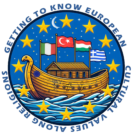Digital Collection of Cultural Values – Summary
As part of the Erasmus+ project “Getting to know European cultural values along religions”, the partner schools from Italy (Sicily), Hungary, Türkiye, and Greece collaborated to produce a digital book titled “Digital Collection of Cultural Values”. This educational resource highlighted the unique cultural identities of each country, focusing on values, traditions, and iconic historical and religious landmarks that define their heritage.
In Italy (Sicily), the collection emphasized the region’s rich multicultural past shaped by Greek, Roman, Arab, and Norman civilizations. Among the most significant historical and religious landmarks featured were the Palermo Cathedral, blending Gothic, Baroque, and Arab-Norman architecture, and the Monreale Cathedral, famous for its Byzantine mosaics. Cultural values such as strong family bonds, devotion to religious festivals like the Feast of Saint Rosalia, and traditional Sicilian cuisine were also included.
From Hungary, the collection showcased the country’s deep connection to folk traditions, classical music, and national identity shaped by both Catholic and Reformed Christian heritage. Important landmarks such as the Great Reformed Church of Debrecen, a symbol of Protestantism, and the Buda Castle and Hungarian Parliament Building in Budapest were featured. Hungarian values of hospitality, craftsmanship, and respect for national history were explored alongside cultural symbols like folk embroidery and dance.
In Türkiye, a country where East meets West, the digital book highlighted its diverse cultural fabric influenced by Ottoman, Seljuk, Byzantine, and Anatolian civilizations. Major religious and historical landmarks such as the Hagia Sophia, Blue Mosque, Topkapı Palace, and Mevlana Museum in Konya were presented. Cultural values such as hospitality, respect for elders, strong family ties, and deep-rooted culinary and musical traditions were emphasized.
The Greek contribution focused on the close connection between cultural identity and Orthodox Christianity, as well as the legacy of Ancient Greece. Important religious and historical sites included the Parthenon and Acropolis, Monastery of Meteora, and Church of Panagia Kapnikarea in Athens. Greek values such as philotimo, family honor, hospitality, and the celebration of both national and religious holidays were portrayed as key elements of everyday life.
Through this digital collection, students explored the cultural richness of their own and their partners’ countries, gaining a deeper appreciation for Europe’s shared heritage. The project not only encouraged intercultural dialogue and mutual understanding but also preserved and promoted local traditions and monuments for future generations.
